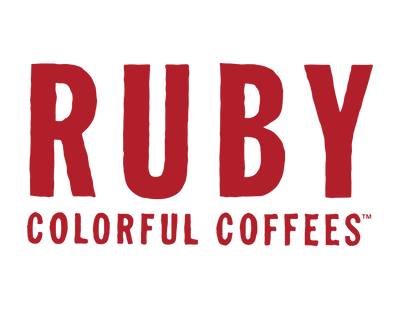Updated July, 2025
Decaffeinated coffee is one of our favorite things at Ruby. It’s no secret that we’re big fans of all-day coffee drinking, and at a certain point, that coffee tends to switch to decaf. Decaf coffee doesn’t always have the best reputation — early versions of decaf were directly treated with solvent chemicals, and often had a bad taste along with raising health concerns amongst potential decaf drinkers. For us, decaf coffee represents the true ideals of a flavor-driven experience. Without caffeine, the main reason to drink coffee is simple: to enjoy it!
We strive to offer amazing tasting decaf options, and we’ve expanded our decaf lineup quite a bit in recent years. We are proud to offer both rotating single origin offerings and Decaf Flume Seasonal Blend as a year-round blend option. We approach the roasting process the same as we do with any of our standard offerings, with the goal of highlighting sweetness and balance. Because of the processing that occurs, however, you may notice more oils rising towards the surface. It doesn’t mean that the coffee is roasted any darker, or is stale, it’s just a byproduct of the decaffeination process.
When a coffee is decaffeinated, the process is designed around removing as much caffeine from the coffee as possible. Most processes remove around 97-98% of the caffeine initially present in the coffee, so there are still trace amounts of caffeine in decaffeinated coffee, and people with an allergy or intolerance to caffeine might still want to avoid decaf coffee. For folks who want some caffeine, we also recommend making your own half-caf blends by ordering a bag of each and combining Portage Seasonal Blend with Decaf Flume Seasonal Blend and the ratios you desire. These pairings are designed to match the components of each coffee to create a more harmonious flavor profile, but you can also blend any caffeinated coffee and decaffeinated coffee to make your own custom flavor profile and caffeine levels.
Many of our Latin American decafs are processed through a method called Ethyl-Acetate decaffeination, which is sometimes called “sugarcane process.” Ethyl-acetate is a naturally occurring ester that is a byproduct of fermenting sugarcane. An ester is an organic compound that reacts with water to form an alcohol, which means it’s a great solvent. Esters are naturally occurring in many fermented products — many of the “fruity” aromas in different beer styles come from esters that are produced during the fermentation process, including ethyl-acetate. Because ethyl-acetate is a naturally occurring effective solvent, it’s a very non-intrusive way to decaffeinate coffee.
The process starts by steaming the green, unroasted coffee to allow it to open its pores. Once the coffee has been lightly steamed, it’s rinsed in ethyl-acetate, which binds to the caffeine molecules and removes the caffeine from the coffee. Once the coffee has been rinsed enough to remove 97% of the caffeine, the coffee is lightly steamed one more time to remove any trace elements of ethyl-acetate.
There are two reasons we really love the ethyl-acetate process for these coffees. The first reason is that this process really preserves the flavors in the coffee. It’s a very non-intrusive processing method, and we think it allows the coffee’s flavor profile to shine. The other main advantage is that the ethyl-acetate process is able to be performed in Colombia and some other producing countries. This means that the coffee isn’t traveling to another country to be processed, and it allows for us to receive the coffee sooner at our warehouse. You can see this process outlined in the graphic below:

The coffees we use in Decaf Flume Seasonal Blend rotate seasonally, but the coffees are only ever processed two ways: the aforementioned ethyl-acetate process for coffees from Colombia, and Mountain Water Process or Swiss Water for coffees sourced from Brazil. The Mountain Water Process is different from ethyl-acetate in that it doesn’t use any solvents. Instead, the green, unroasted coffee is soaked in a water solution that removes caffeine and flavor compounds from the coffee. After that, the water is run through a special filter that’s able to extract the caffeine from the solution. Then, the caffeine-less solution is re-introduced to the green coffee so it is able to re-absorb flavor compounds that were previously extracted.
The Mountain Water Process is managed at a plant in Mexico called Descamex. For Brazil, a country that produces very large lots of coffee, the Mountain Water Process is a great way of decaffeinating large amounts of coffee while still retaining a great flavor profile.
At Ruby, we’re very proud of both of our decaf coffee options. We think that both coffees are great for espresso and for drip brewing, and both show a lot of versatility and sweetness. While making sure we have two fantastic decaf options is important for our own coffee drinking habits, we hope that you’re intrigued as well and consider picking up a bag of decaf in your next order!
